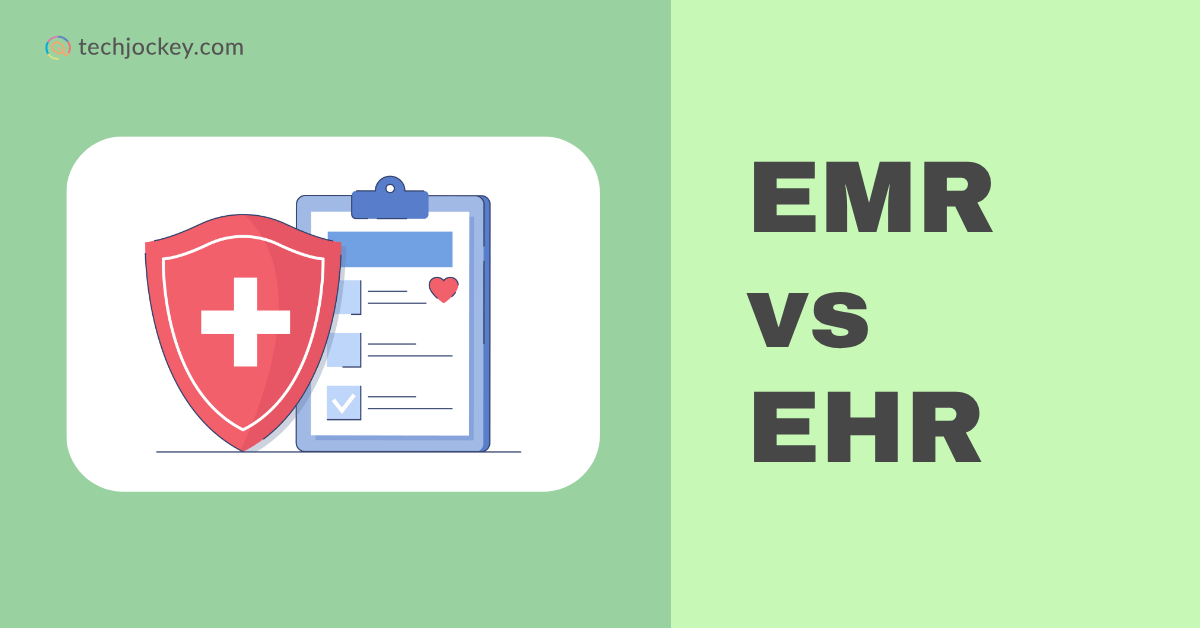
Did you know that by 2025, more than 95% of hospital facilities in the U.S and 90% of working physicians will access some type of electronic record.
The two terms EMR vs EHR under electronic records are confusing many. These might seem similar terms, but they serve different purposes.
The first major step was EMRs: just digital versions of the paper charts people used to keep, in one doctor’s office. They assisted clinicians in monitoring the history, medications, and test results of patients more accurately.
But afterwards, healthcare needed something wider, and EMR vs EHR became a crucial distinction as EHRs came into existence. EHRs were developed in order to connect clinics, specialists, and hospitals together to enable them to share patient updates. Electronic health record systems today are the foundation of care coordination, patient portals, telehealth, as well as real-time data exchange.
This blog will give you a clear understanding of EHR vs EMR.
Electronic Medical Record (EMR) simply refers to an electronic copy of a paper chart at your local doctor. It stores common information such as your health record, conditions, prescriptions, allergies, vaccine dates, and treatment records, all in a single practice or clinic. EMRs have definite advantages compared to paper-based files:
There is, however, one major drawback of EMRs: they are not easy to transport outside the clinic building. Your record may have to be printed and sent by snail mail or FAX in order to be used by another specialist or hospital.
Briefly, EMRs are good for maintaining your healthcare data organized at a single doctor, but they are not designed to quickly share reports to other care centers.
Medixcel EMR
Starting Price
₹ 24000.00 excl. GST
Healthcare as we know it has been changed since moving from handwritten charts to electronic medical records (EMRs), yet not without trade-offs. Although the adoption of EMRs may be promising in terms of increasing accuracy and efficiency, the situation on the ground is more complicated.
The strengths of EMRs over paper records are easy to see:
Healthplix EMR
Starting Price
Price on Request
An Electronic Health Record (EHR) is not merely a digital version of paper charts; it is something more than that.
It holds not just basic details like history and lab results but also connects information from the patient’s entire healthcare journey. This may be insurance, demographic data, and even wearable wellness device data.
An EHR is designed to travel with you, not to be confined to one office or hospital. Your record can be accessed and updated by authorized providers such as labs, imaging centers, pharmacies, and emergency departments. The cloud-based EHR systems go a step further and allow sharing data in real-time.
As HIMSS Analytics put it, the true strength of an EHR lies in its ability to move with the patient, making your health information more useful and powerful wherever you go.
CureMD EHR
Starting Price
Price on Request
Therapynotes
Starting Price
$ 59.00
| EMR | EHR | |
|---|---|---|
| What it is | Digital chart from one clinic | Complete digital record of your health |
| Scope | Single provider or practice | Multiple providers, hospitals, and labs |
| Purpose | Track care at one location | Coordinate and improve care across locations |
| Sharing | Rarely shared outside | Easily shared among authorized providers |
| Patient access | Often limited | Patients usually have access (patient portal) |
| Data use | Mainly for diagnosis & treatment | Patients usually have access to (patient portal) |
Absolutely! Here are reasons why electronic records, be it EMR or EHR, are important:
Conclusion
Put simply, electronic records are not only about becoming paperless; they help in making healthcare safer, quicker, coordinated, and patient-centric.
While EMR vs EHR both digitize patient information, the real difference is bigger than it seems: EMRs are designed to keep records organized within a single clinic or practice. However, EHRs move with a patient and bridge different systems and providers.
As healthcare will continue to change, knowing the difference between EMR and EHR can enable all, including doctors and patients understand how digital tools can truly improve care.
Employee engagement has of late emerged as primary measure for seeing if a brand… Read More
HR operations may seem easily manageable on paper, but real experiences often tell different… Read More
Healthcare often feels complicated, slow, and scattered across many disconnected systems. Patients carry reports, repeat… Read More
The present-day workplace hardly bears any resemblance to the traditional setups of bygone eras. Diverse… Read More
Fruitful interaction in the modern market requires rapid speed, rich context, and genuine empathy. Shoppers… Read More
Staying compliant is one of the most important parts of running business. Labor laws,… Read More